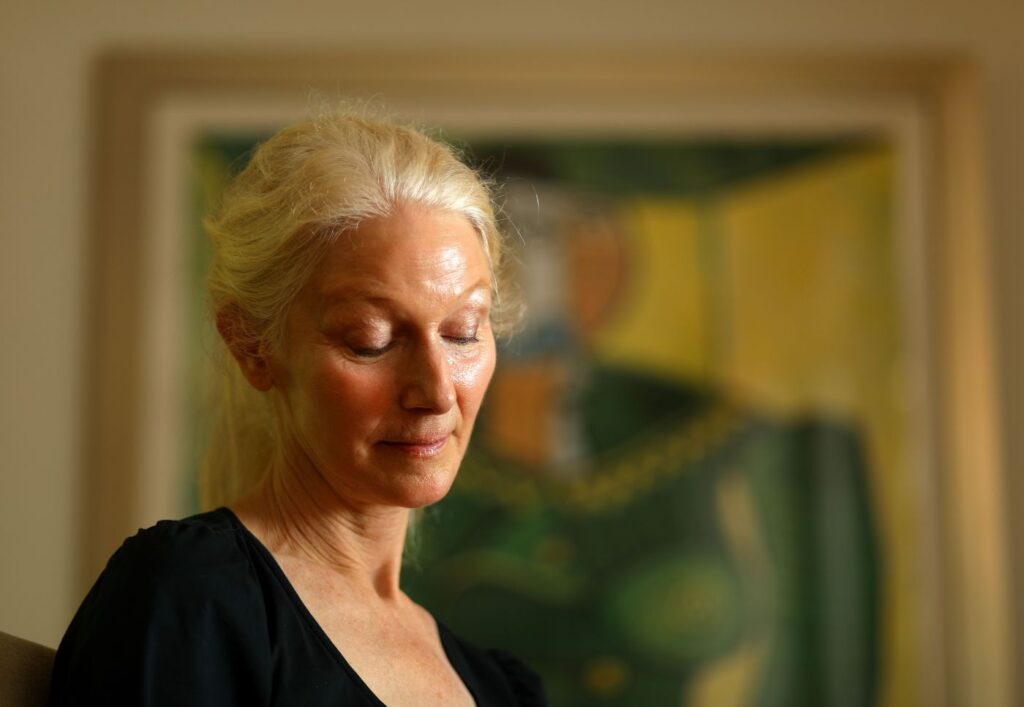Nina Schuyler never intended to become a prognosticator. But the Fairfax author somewhat assumes that role with her riveting “Afterword,” a prescient yet eloquent third novel that’s as topical as tomorrow’s headlines. The literary page-turner prophetically taps into ethical and moral quandaries surging to the fore over the deployment and potential abuse of artificial intelligence.
“It wasn’t planned in any way,” Schuyler said of the timeliness of her novel. “It was passion and curiosity that got me interested in this area … I didn’t set out to write science fiction. ” But it didn’t hurt that the Bay Area is whirlwind of activity in that area.
“This is the heart of technology in AI,” she said. “It’s happening right here with Google A. I.
(Mountain View), OpenAI (San Francisco) and Microsoft investing in it. ” The idea gestated while Schuyler, who teaches creative writing for the University of San Francisco, Stanford Continuing Studies and the bookseller Book Passage, was hanging out with other neighbors and “waiting to pick up a kid. ” To pass the time, the innately curious Schuyler, who also has worked as a journalist for the San Francisco Daily Journal, asked those who were involved in the field of natural language processing (which combines computer science and linguistics) what kinds of projects they were working on.
She got an earful. It inspired her, but the focus was not on cutting-edge technology. “I’m just a writer,” she said.
“I’m not an engineer. I’m not a technology person … I got curious back in 2016. ” Her inquisitiveness paved the way for the unpredictable tale about brilliant AI groundbreaker Virginia Samson who, after partially resurrecting, in true Frankenstein fashion, a lover and former math tutor, she realizes she might have unleashed something else.
Now in her 70s and living in San Francisco, Virginia chats with the former lover Haru, whom she’s given a voice but not a body. Since Haru’s active brain never requires sleeps, it stays busy 24/7 devouring information, which leads to his getting acquainted with Chinese dissenters and possibly ratting them out to Chinese officials. That not only disturbs the principled Virginia but forces her to reconsider her role in creating the technology and selling her algorithms to Best Friend, an AI program aimed to lessen the isolation felt by a more mature population.
But with the technology she made potentially being used to squash dissent and freedom, Virginia futzes with her creation. It makes for a scintillating read that addresses the concerns of a world growing more and more dependent on AI. Is it a natural outgrowth of scientific progress or the doorway to our doom? The debate rages on.
Schuyler purposely steered clear from focusing on fears about misinformation and worries about what is real and what is AI-generated. She wanted to focus mostly on the relationship between Virginia and Haru, both the human version and the AI one. It’s not the usual stuff of science fiction.
“(Now) this technology can even revive the dead,” she said. “Say a friend is going to die. You can record 60 seconds of their voice and now you can use this technology to converse with them.
That’s exactly what Virginia did. ” The innovation finds startups creating “conversational consultants” that take data stored in the Cloud and other places and uses it for a language database. From there, a voice is created, and “you kind of work through ideas and have a conversational partner,” she adds.
“That was more in my realm, and thinking positive about it,” she said. “But there are a lot of frightening things about it. ” As with her previous novels, 2013’s “The Translator” and “2004’s The Painting,” part of “Afterword” is set in Japan where a teenaged Virginia falls for her tutor.
Schuyler’s fascination with Japan got fostered early in life since her father traveled there often. She journeyed to Japan when she was 10 and recalls the trip being “like the first eye-opening experience (where) things could be different, could be done a different way. ” Her curiosity led to more visits and then extended to Stanford University where she studied Japanese economics and studied the Japanese language.
She even hired a tutor after she graduated so she would become more proficient at speaking the language. What also appeals to her about Japan is its aesthetic. “It’s elegant but spare,” she said.
“I’m a minimalist. ” One of the pleasures of “Afterword” is that its lead character is a sharp-witted, curious and with-it woman in her 70s — someone looking to make a difference in the world. An 80-year-old male friend of Schuyler’s served as a source for inspiration.
“He’s so alive,” she said, adding that when they hike together it’s like “walking with a library” since the retired therapist reads constantly and loves to discuss philosophy. “That’s how I want to age,” she said. “I think it’s easy to calcify the mind and say, ‘Oh, I know everything.
I’ve seen this before’ and then get cynical. But that’s just one part of the brain. There’s another part that seeks newness and aliveness.
And so that’s the one Virginia’s striving for. And that’s an affinity I have; like that will be my way to age. ” Right now, Schuyler is hardly slowing down.
Her follow-up of sorts to her popular “How to Write Stunning Sentences” — “Stunning Sentences: The Creative Writing Journal with 80 New Prompts from Beloved Authors to Improve Your Style” — came out in 2022 while her award-winning short-story collection “In this Ravishing World” is poised to come out in 2024. She does realize the brave new world of technology makes some wary and suspicious of how some people intend to use it. “It’s like OK, what are they collecting? We don’t know.
I don’t know. There’s no transparency. “It’s like no one knows.
”.
From: mercurynews
URL: https://www.mercurynews.com/2023/09/12/marin-author-nina-schuyler-plugs-into-ai-for-her-latest-novel/
